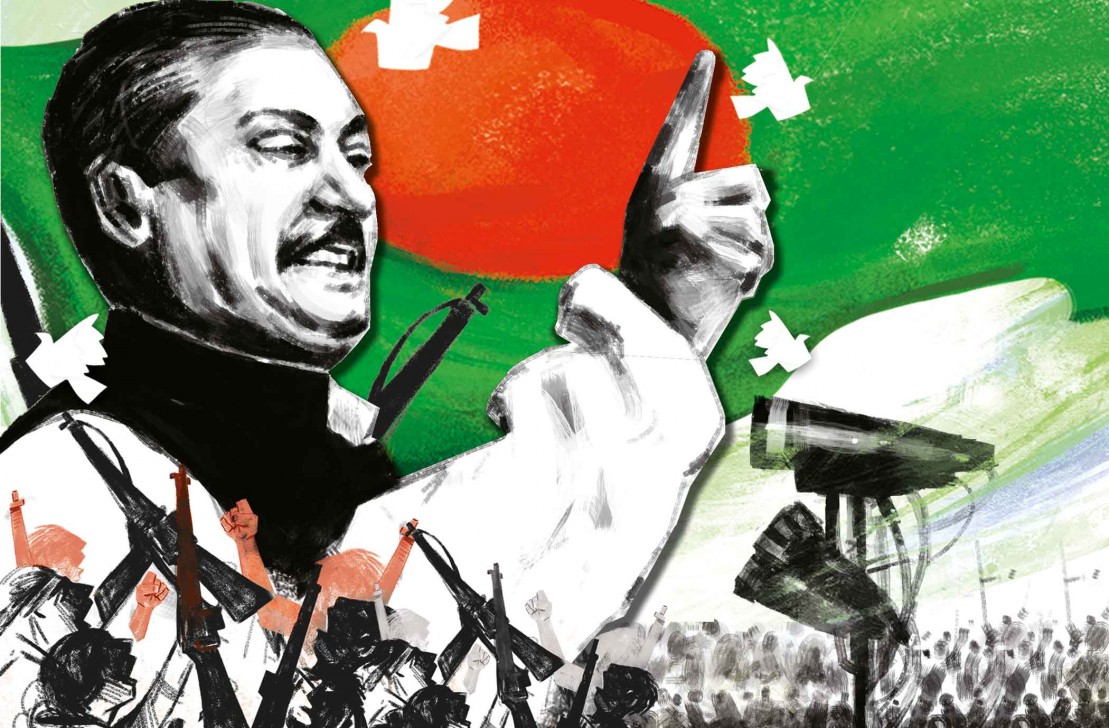It was the afternoon of March 7, 1971, the day Bangabandhu Sheikh Mujibur Rahman made the historic speech that would resonate throughout the annals of history, changing its course forever.
Bangabandhu unequivocally declared, "The struggle this time is for emancipation. The struggle this time is for independence."
Bangabandhu called for a peaceful, non-cooperation movement to continue the struggle for independence and the emancipation of the Bengalis. He issued several directives for a civil disobedience movement -- people should not pay taxes; government servants should take orders only from him; the secretariat, government and semi-government offices and courts in East Pakistan should observe strikes; with necessary exemptions announced from time to time, only local and inter-district telephone lines should function; railways and ports could continue to function, but their workers should not co-operate if they were used to repress the people of East Pakistan.
In his speech, Bangabandhu refuted Yahya's charge [Yahya's 6th March speech] that the Awami League was primarily responsible for the present situation. He said that he had placed a call to Yahya the previous week urging him to visit East Pakistan to see personally how military bullets were killing Benglaee civilians.
Bangabandhu laid down his terms for attending the National Assembly session which Yahya had on the previous day called for March 25: withdrawal of army to barracks; an end to martial law; and the transfer of power to the people. He also demanded an inquiry into the army killings and an end to the reinforcement of the army in East Pakistan.
East Pakistan police intelligence estimated that there were 12 lakh people present in the public meeting. [East Pakistan Police Abstract of Intelligence, March 13, 1971]
The historic 7th March speech is now included in Unesco's Memory of the World Register as a documentary heritage.
MARTIAL LAW ADMINISTRATORS' REACTION
The general reaction of the martial law authorities to the 7th March speech was that of relief. In a reply to the call of Yahya Khan, a senior officer reported, "This is the best speech under the circumstances." [Siddiq Salik, Witness to Surrender, UPL 1997, pg. 54]
Khadim Hussain Raja, then General Officer Commanding in East Pakistan, terms Sheikh Mujib's speech, in comparison with Yahya Khan's 6th March speech, "remarkably conciliatory". He further writes, "Credit goes to Sheikh Mujib for averting an immediate crisis and for preventing a lot of Bengali blood being split on the streets of Dhaka." [Khadim Hussain Raja, a stranger in my own country, UPL 2012, pg. 63]
"WHAT DOES MUJIB NOW INTEND?": AMERICAN ASSESSMENT
American observers were in general agreement that a showdown of force had been averted but the crisis remains unchanged. Dhaka's American Consulate was optimistic. Archer K Blood, then American Consul General writes in his memoir: "The situation remains confused as two sides jockey for position and wait for others to force the issue. Mujib has, we believe, defused the immediate crisis. … Little by little the Sheikh and the Awami League become the de facto authority in East Pakistan. Meanwhile, the concept of Pakistan continues to erode. The Sheikh's tactics, if successful, reduce the chances of open confrontation by exposing only a fuzzy target for the MLA [Martial Law Administration]. At the same time, he keeps the initiative and maintains control of the situation.
American Embassy in Islamabad was more pessimistic in their assessment: "Thus, events of March 6-7 have deferred showdown, but have not altered basic elements. Bengalis appear bent on a degree of autonomy the Pak military (and probably Bhutto) unable to swallow. The question now is whether Yahya or Mujib will blink first – or whether neither will blink. Showdown cannot be put off much longer."
In their assessment of what does Mujib now intend the US Embassy report wrote: "His goal remains unchanged – 'Emancipation' of Bangla Desh from West Pakistan domination. This could mean full provincial autonomy' as under six points. It could also mean Mujib has come to believe that the freedom he seeks is attainable only by outright independence."
Tags :







0 Comments